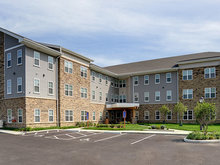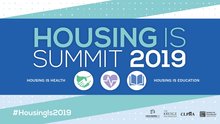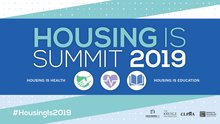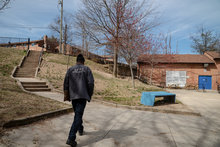0
Publication
Community:
Jun 17, 2021
Authored by: U.S. Department of Housing and Urban Development Choice Neighborhoods
Topics: Attendance, COVID-19, Early childhood, Education, Family engagement, Housing, Low-income, Out-of-school time, Youth
 Shared by Kirsten Greenwell
Shared by Kirsten Greenwell
Kirsten Greenwell posted a
on Jun 17, 2021
U.S. Department of Housing and Urban Development Choice Neighborhoods
0
Video
Community:
May 18, 2021
Keynote: Michael Bennet (D-Co), Congressional Video Message.
Plenary: Reducing Childhood Poverty.
Following Housing Is' 2019 Summit discussion of reducing childhood poverty and the idea of a university child allowance, this panel will explore the renewed discussion of legislation around a child tax credit and the idea of a universal basic income.
Authored by: CLPHA
Topics: Child welfare, Community development, Housing, Legislation & Policy, Low-income, Racial inequalities, Youth
 Shared by Housing Is
Shared by Housing Is
Housing Is posted a
on May 18, 2021
Keynote: Michael Bennet (D-Co), Congressional Video Message.
Plenary: Reducing Childhood Poverty.
Following Housing Is' 2019 Summit discussion of reducing childhood poverty and the idea of a university child allowance, this panel will explore the renewed discussion of legislation around a c
0
Podcast
Community:
Jan 13, 2021
On a day-to-day basis, vulnerable populations suffer from inequities in health, wealth, and education. These same people are then disproportionately impacted by catastrophes ranging from hurricanes to COVID-19, which only serve to underline the great and urgent need for equity across race, gender, and income. In the latest episode of The Intersect, Madeline Colety and Lorine Giangola discuss how Abt’s housing and resilience work is helping clients promote equity.
Authored by: Madeline Colety & Lorine Giangola for ABT ASSOCIATES
Topics: Advocacy, Community development, Education, Food insecurity, Health, Healthy homes, Homelessness, Housing, Low-income, Partnerships, Racial inequalities
 Shared by Housing Is
Shared by Housing Is
Housing Is posted a
on Jan 14, 2021
Madeline Colety & Lorine Giangola for ABT ASSOCIATES
On a day-to-day basis, vulnerable populations suffer from inequities in health, wealth, and education.
0
Report
Community: Youth
Nov 3, 2020
As housing costs have escalated and inequities persist across the country, many young people need flexible, empowerment-based investments to get stably housed and onto a path to thriving. To this end, direct financial assistance (“cash transfers”) with other supports offer a promising solution grounded in a robust global evidence base. The circumstances of COVID-19 amplify the importance of developing and evaluating youth-informed approaches to doing things differently.
This report shares results and implications of a year-long research and stakeholder engagement process that Chapin Hall conducted in collaboration with Point Source Youth to inform the development of a Direct Cash Transfer Program (DCTP) for youth experiencing homelessness. We look forward to piloting and rigorously evaluating a program based on these findings, starting in NYC.
Authored by: Matthew Morton for CHAPIN HALL AT THE UNIVERSITY OF CHICAGO
Topics: Community development, Funding, Homelessness, Housing, Low-income, Youth
 Shared by Housing Is
Shared by Housing Is
Housing Is posted a
on Nov 3, 2020
Matthew Morton for CHAPIN HALL AT THE UNIVERSITY OF CHICAGO
As housing costs have escalated and inequities persist across the country, many young people need flexible, empowerment-based investments to get stably housed and onto a path to thriving.
0
Report
Community: Postsecondary
May 2, 2019
Innovative public housing authorities (PHAs) are collaborating with college access partners and community colleges to increase postsecondary educational achievement for low-income residents and college students experiencing homelessness. This report elevates 11 shared learnings from a recent convening of these five pioneering PHAs and their postsecondary collaborators, and offers a series of recommendations to policy makers, PHAs, and philanthropic organizations seeking to develop emerging cross-sector collaborations between housing and education organizations. The report also includes an overview of the federal policies that support and limit postsecondary achievement for students served by PHAs, and profiles of the five partnerships: CHA and partners City Colleges of Chicago and One Million Degrees; CMHA and partner Columbus State Community College; HACLA and partner Southern California College Access Network (SoCal CAN); LMHA and partner Family Scholar House; and THA and partner Tacoma Community College.
Authored by: Abra Lyons-Warren for CLPHA
Topics: CLPHA, Education, Housing, Legislation & Policy, Low-income, Partnerships, Post-secondary, Stability
 Shared by Abra Lyons-Warren
Shared by Abra Lyons-Warren
Abra Lyons-Warren posted a
on Oct 6, 2020
Abra Lyons-Warren for CLPHA
Innovative public housing authorities (PHAs) are collaborating with college access partners and community colleges to increase postsecondary educational achievement for low-income residents and college students experiencing homelessness.
0
Policy Brief
Community:
Dec 4, 2019

In California, more than 3.7 million students were eligible for free or reduced priced school meals in the 2017-2018 school year. For many of those students, school meals are the primary source of regular access to healthy food. When the bell rings at 3:00 or lets out for summer break, many of those students go home to nutritional uncertainty or high-calorie, low-nutrient foods.
For many low-income families, the out-of-school-time food access gap increases family stress: limited budgets are stretched further to cover food, rent, utilities, transportation, medications, and chidcare costs. For very young children, food insecurity can negatively impact brain and physical development. For children of all ages, disrupted access to healthy food can impact behavior, increase risk of obesity, make it harder to concentrate, or exacerbate existing healthy conditions like type 2 diabetes. The impact is not limited to summer, and can lead to a rocky start to the school year, negatively impacting school attendance and students’ ability to effectively participate in school.
Read the full brief to learn how public and affordable housing communities can address food insecurity for children and youth with the help of out-of-school-time USDA child nutrition programs.
Authored by:
Topics: Advocacy, Early childhood, Food insecurity, Health, Healthy homes, Housing, Legislation & Policy, Low-income, Nutrition, Out-of-school time, West Coast, Youth
 Shared by Linda Lu
Shared by Linda Lu
Linda Lu posted a
on Dec 4, 2019
In California, more than 3.7 million students were eligible for free or reduced priced school meals in the 2017-2018 school year. For many of those students, school meals are the primary source of regular access to healthy food.
0
Report
Community:
Nov 7, 2019
How Housing Programs Can Support the Educational Needs of Children Living in Publicly Supported Homes
Authored by: Public and Affordable Housing Research Corporation
Topics: Attendance, Broadband, Child welfare, Early childhood, Health, Housing, Literacy, Low-income, Out-of-school time, Partnerships, Place-based, Research, School-readiness
 Shared by Kelly McElwain
Shared by Kelly McElwain
Kelly McElwain posted a
on Nov 7, 2019
Public and Affordable Housing Research Corporation
How Housing Programs Can Support the Educational Needs of Children Living in Publicly Supported Homes
0
Report
Community:
Jun 6, 2019
Trends in Housing Assistance and Who it Serves
Authored by: PAHRC
Topics: Community development, Disabilities, Education, Funding, Health, Homelessness, Housing, Legislation & Policy, Low-income, Partnerships, Research, Seniors, Workforce development, Youth
 Shared by Keely Stater
Shared by Keely Stater
Keely Stater posted a
on Sep 10, 2019
Trends in Housing Assistance and Who it Serves
0
News Article
Community:
Jun 9, 2019
When applications opened for New York City’s first affordable housing property for LGBTQ older adults recently, 1,000 people eagerly sent theirs in on that first day.
Authored by: Grace Birnstengel for Forbes
Topics: East Coast, Homelessness, Housing, Low-income, Seniors
 Shared by Housing Is
Shared by Housing Is
Housing Is posted a
on Jun 13, 2019
Grace Birnstengel for Forbes
When applications opened for New York City’s first affordable housing property for LGBTQ older adults recently, 1,000 people eagerly sent theirs in on that first day.
0
News Article
Community:
Jun 10, 2019
More than a half million renters have been evicted in Los Angeles County over the past eight years, according to a new report by Public Counsel and the UCLA School of Law that calls on county supervisors to adopt permanent rent control measures.
Authored by: Jenna Chandler for Curbed Los Angeles
Topics: Homelessness, Housing, Legislation & Policy, Low-income, Research, West Coast
 Shared by Housing Is
Shared by Housing Is
Housing Is posted a
on Jun 13, 2019
Jenna Chandler for Curbed Los Angeles
More than a half million renters have been evicted in Los Angeles County over the past eight years, according to a new report by Public Counsel and the UCLA School of Law that calls on county supervisors to adopt permanent rent control measures.
0
Webinar
Community:
Jun 11, 2019
CLPHA’s Education Working Group convened on Tuesday, June 11 to learn about one of the Housing Authority of Kansas City’s (HAKC) newest housing communities: Pemberton Park, a subsidized apartment building that serves grandparents caring for grandchildren. Representatives from HAKC and their partners discussed the process of establishing the grand-family complex, as well as challenges and successes they experienced along the way.
Authored by: CLPHA, Housing Is
Topics: Education, Family engagement, Housing, Housing Is Working Group, Low-income, Partnerships, Seniors, Youth
 Shared by Housing Is
Shared by Housing Is
Housing Is posted a
on Jun 11, 2019
CLPHA’s Education Working Group convened on Tuesday, June 11 to learn about one of the Housing Authority of Kansas City’s (HAKC) newest housing communities: Pemberton Park, a subsidized apartment building that serves grandparents caring for grandchildren.
0
Publication
Community:
Opened in summer 2018 on the north side of Columbus, Ohio, Laurel Green Apartments is an affordable permanent supportive housing development for residents with mental health conditions.
Authored by: PD&R Edge Online Magazine
Topics: Homelessness, Housing, Low-income, Mental health, Supportive housing
 Shared by Housing Is
Shared by Housing Is
Housing Is posted a
on Jun 11, 2019
PD&R Edge Online Magazine
Opened in summer 2018 on the north side of Columbus, Ohio, Laurel Green Apartments is an affordable permanent supportive housing development for residents with mental health conditions.
0
News Article
Community:
Recognizing that the aging of its population will reshape housing needs, the city of Washington, DC, has fostered numerous options for older residents, including some that are intentionally multigenerational.
Authored by: PD&R Edge Online Magazine
Topics: Early childhood, Family engagement, Housing, Low-income, Seniors, Youth
 Shared by Housing Is
Shared by Housing Is
Housing Is posted a
on Jun 11, 2019
PD&R Edge Online Magazine
Recognizing that the aging of its population will reshape housing needs, the city of Washington, DC, has fostered numerous options for older residents, including some that are intentionally multigenerational.
0
News Article
Community:
Jun 5, 2019
Patients are dealing with stress related to the social determinants of health, including stable housing, food security, and adequate transportation.
Authored by: Jessica Kent for Health IT Analytics
Topics: Food insecurity, Health, Housing, Low-income, Nutrition, Transportation
 Shared by Housing Is
Shared by Housing Is
Housing Is posted a
on Jun 11, 2019
Jessica Kent for Health IT Analytics
Patients are dealing with stress related to the social determinants of health, including stable housing, food security, and adequate transportation.
0
Report
Community:
Oct 17, 2018
The primary objectives of this study are (1) to provide insights into the factors associated with landlord decisions about whether to participate in the HCV program and (2) to identify a collection of promising and innovative practices that Public Housing Authorities (PHAs) have used to increase landlord participation in the HCV program, especially in these low-poverty neighborhoods. This study employs a mixed-method research design composed of quantitative and qualitative components.
Authored by: Department of Housing and Urban Development (HUD), Office of Policy Development and Research
Topics: Housing, Low-income, Research
 Shared by Housing Is
Shared by Housing Is
Housing Is posted a
on May 29, 2019
Department of Housing and Urban Development (HUD), Office of Policy Development and Research
The primary objectives of this study are (1) to provide insights into the factors associated with landlord decisions about whether to participate in the HCV program and (2) to identify a collection of promising and innovative practices that Public Housing Authorities (PHAs) have used to increase lan
0
Report
Community:
May 1, 2019
Child poverty is an urgent and preventable crisis. Solutions to child poverty already exist if we just expand and invest in them. Benefits like nutrition assistance, housing vouchers and tax credits helped lift nearly 7 million children out of poverty in 2017, but millions of children were left behind due to inadequate funding, eligibility restrictions and low wages. We can and must fix these problems to help more children escape poverty now.
Authored by: Children's Defense Fund
Topics: Child welfare, Dual-generation, Early childhood, Food insecurity, Funding, Housing, Legislation & Policy, Low-income, Research, Workforce development
 Shared by Housing Is
Shared by Housing Is
Housing Is posted a
on May 28, 2019
Child poverty is an urgent and preventable crisis. Solutions to child poverty already exist if we just expand and invest in them.
0
Video
Community:
May 24, 2019
With ever-growing interest in the intersection between housing and health, researchers are evaluating the impact of cross-sector interventions. This session will bring together researchers to share insights from their work relevant to practitioners and policymakers.
Authored by: Housing Is, CLPHA
Topics: CLPHA, Health, Homelessness, Housing, Low-income, Partnerships, Research, Seniors
 Shared by Housing Is
Shared by Housing Is
Housing Is posted a
on May 24, 2019
With ever-growing interest in the intersection between housing and health, researchers are evaluating the impact of cross-sector interventions. This session will bring together researchers to share insights from their work relevant to practitioners and policymakers.
0
Video
Community:
May 24, 2019
A landmark National Academies of Sciences report commissioned by Congress concludes that childhood poverty in the U.S. could be cut in half within a decade with appropriate action. The report culls through the existing evidence-base to identify the most impactful existing policies including the Earned Income Tax Credit (EITC) and housing assistance. This panel will also discuss promising new policies that if enacted could help reduce poverty such as the child allowance.
Authored by: Housing Is, CLPHA
Topics: Child welfare, CLPHA, Housing, Legislation & Policy, Low-income, Partnerships, Research
 Shared by Housing Is
Shared by Housing Is
Housing Is posted a
on May 24, 2019
A landmark National Academies of Sciences report commissioned by Congress concludes that childhood poverty in the U.S. could be cut in half within a decade with appropriate action.
0
Publication
Community:
May 20, 2019
African-Americans are three times more likely to die from asthma as whites. In Philadelphia and elsewhere, how can outcomes improve with changes to housing quality and pollution control?
Authored by: Sophia Newman for Next City
Topics: Asthma, Health, Housing, Low-income, Racial inequalities
 Shared by Housing Is
Shared by Housing Is
Housing Is posted a
on May 23, 2019
Sophia Newman for Next City
African-Americans are three times more likely to die from asthma as whites. In Philadelphia and elsewhere, how can outcomes improve with changes to housing quality and pollution control?
0
Publication
Community:
May 22, 2019
In May 2018, Kaiser Permanente, the largest private integrated care system in the US, announced that it would invest $200 million through its Thriving Communities Fund to address the affordable housing crisis in California’s Bay Area. Then in 2019, Kaiser announced that it used the fund to purchase an apartment building in a diverse but quickly gentrifying neighborhood in Oakland with the express purpose of making repairs and upgrades to improve health in the building and to ensure affordability to current residents. If Kaiser wanted to improve health, why wouldn’t it focus solely on housing upgrades, which research shows can produce positive health outcomes (PDF)? Why would it include maintaining affordability in its mandate?
Authored by: Martha Fedorowicz for How Housing Matters, The Urban Institute
Topics: Health, Housing, Low-income
 Shared by Housing Is
Shared by Housing Is
Housing Is posted a
on May 23, 2019
Martha Fedorowicz for How Housing Matters, The Urban Institute
In May 2018, Kaiser Permanente, the largest private integrated care system in the US, announced that it would invest $200 million through its Thriving Communities Fund to address the affordable housing crisis in California’s Bay Area.
0
News Article
Community:
May 16, 2019
Mold. Leaks. Rodents. Crime. These are just some of the things the nation's 2 million public housing residents have to worry about. Many of the buildings they live in have been falling into disrepair for decades. Public housing officials estimate that it would cost $50 billion to fix them up. But the Trump administration wants to eliminate the federal fund now used to repair public housing in favor of attracting more private investment to fix up and replace it.
Authored by: Pam Fessler for NPR
Topics: CLPHA, Funding, Housing, Legislation & Policy, Low-income
 Shared by Housing Is
Shared by Housing Is
Housing Is posted a
on May 20, 2019
Mold. Leaks. Rodents. Crime. These are just some of the things the nation's 2 million public housing residents have to worry about. Many of the buildings they live in have been falling into disrepair for decades. Public housing officials estimate that it would cost $50 billion to fix them up.
0
News Article
Community:
May 12, 2019
Charlotte city planners working to rewrite outdated zoning codes are exploring a controversial and bold idea of eliminating single-family zoning. Leaders are following cues from other cities like Minneapolis, Minnesota, and Grand Rapids, Michigan, which have taken the step in an effort to undo decades of racial segregation and income inequality in housing.
Authored by: Jessa O'Connor for WFAE 90.7
Topics: Housing, Legislation & Policy, Low-income, Racial inequalities, South
 Shared by Housing Is
Shared by Housing Is
Housing Is posted a
on May 20, 2019
Jessa O'Connor for WFAE 90.7
Charlotte city planners working to rewrite outdated zoning codes are exploring a controversial and bold idea of eliminating single-family zoning.
0
Communications
Community:
On May 10, 2019, the U.S. Department of Housing and Urban Development (HUD) published a proposed rule that would prohibit “mixed-status" families from living in public and other subsidized housing. Mixed-status families are households that include both members who are eligible and ineligible for housing assistance based on their immigration status. Both statute and regulation allow families to live together in subsidized housing even if one family member is ineligible so long as the housing subsidy is decreased to exclude the ineligible person from the assistance. Importantly, just because a household member is an “ineligible” immigrant, it doesn’t mean that they are undocumented. Immigrants can have legal status and still not be eligible for public housing and Section 8 programs.
Authored by: National Low Income Housing Coalition and National Housing Law Project
Topics: Homelessness, Housing, Immigrants, Legislation & Policy, Low-income
 Shared by Housing Is
Shared by Housing Is
Housing Is posted a
on May 15, 2019
National Low Income Housing Coalition and National Housing Law Project
On May 10, 2019, the U.S. Department of Housing and Urban Development (HUD) published a proposed rule that would prohibit “mixed-status" families from living in public and other subsidized housing.
0
News Article
Community:
May 15, 2019
Other cities have combined books and subsidized housing, but the outgoing mayor, Rahm Emanuel, has embraced the concept with three striking new projects.
Authored by: Michael Kimmelman for The New York Times
Topics: Housing, Literacy, Low-income, Midwest, Youth
 Shared by Housing Is
Shared by Housing Is
Housing Is posted a
on May 15, 2019
Michael Kimmelman for The New York Times
Other cities have combined books and subsidized housing, but the outgoing mayor, Rahm Emanuel, has embraced the concept with three striking new projects.
0
Video
Community:
Resident story gallery
Authored by: National Housing Trust and Enterprise Community Partners
Topics: Communications, Homelessness, Housing, Low-income
 Shared by Housing Is
Shared by Housing Is
Housing Is posted a
on May 13, 2019
National Housing Trust and Enterprise Community Partners
 Shared by Kirsten Greenwell
on Jun 17, 2021
Shared by Kirsten Greenwell
on Jun 17, 2021
 Shared by Housing Is
on May 18, 2021
Shared by Housing Is
on May 18, 2021

 Shared by Housing Is
on Jan 14, 2021
Shared by Housing Is
on Jan 14, 2021


 Shared by Housing Is
on Nov 3, 2020
Shared by Housing Is
on Nov 3, 2020

 Shared by Abra Lyons-Warren
on Oct 6, 2020
Shared by Abra Lyons-Warren
on Oct 6, 2020

 Shared by Linda Lu
on Dec 4, 2019
Shared by Linda Lu
on Dec 4, 2019

 Shared by Kelly McElwain
on Nov 7, 2019
Shared by Kelly McElwain
on Nov 7, 2019

 Shared by Keely Stater
on Sep 10, 2019
Shared by Keely Stater
on Sep 10, 2019


 Shared by Housing Is
on Jun 13, 2019
Shared by Housing Is
on Jun 13, 2019

 Shared by Housing Is
on Jun 13, 2019
Shared by Housing Is
on Jun 13, 2019
 Shared by Housing Is
on Jun 11, 2019
Shared by Housing Is
on Jun 11, 2019

 Shared by Housing Is
on Jun 11, 2019
Shared by Housing Is
on Jun 11, 2019


 Shared by Housing Is
on Jun 11, 2019
Shared by Housing Is
on Jun 11, 2019


 Shared by Housing Is
on Jun 11, 2019
Shared by Housing Is
on Jun 11, 2019

 Shared by Housing Is
on May 29, 2019
Shared by Housing Is
on May 29, 2019
 Shared by Housing Is
on May 28, 2019
Shared by Housing Is
on May 28, 2019

 Shared by Housing Is
on May 24, 2019
Shared by Housing Is
on May 24, 2019


 Shared by Housing Is
on May 24, 2019
Shared by Housing Is
on May 24, 2019

 Shared by Housing Is
on May 23, 2019
Shared by Housing Is
on May 23, 2019
 Shared by Housing Is
on May 23, 2019
Shared by Housing Is
on May 23, 2019

 Shared by Housing Is
on May 20, 2019
Shared by Housing Is
on May 20, 2019


 Shared by Housing Is
on May 20, 2019
Shared by Housing Is
on May 20, 2019

 Shared by Housing Is
on May 15, 2019
Shared by Housing Is
on May 15, 2019

 Shared by Housing Is
on May 15, 2019
Shared by Housing Is
on May 15, 2019

 Shared by Housing Is
on May 13, 2019
Shared by Housing Is
on May 13, 2019




